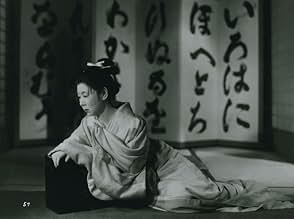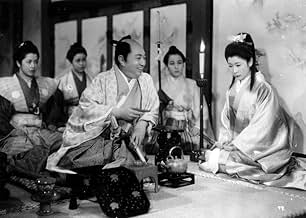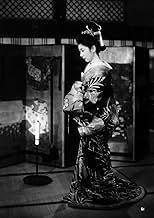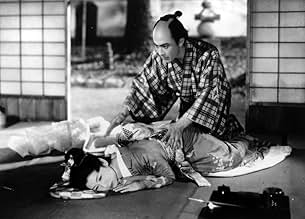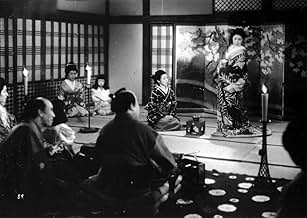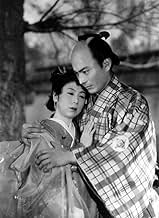CALIFICACIÓN DE IMDb
8.1/10
8.1 k
TU CALIFICACIÓN
La lucha de una mujer y su supervivencia en medio de las vicisitudes de la vida y la crueldad de la sociedad.La lucha de una mujer y su supervivencia en medio de las vicisitudes de la vida y la crueldad de la sociedad.La lucha de una mujer y su supervivencia en medio de las vicisitudes de la vida y la crueldad de la sociedad.
- Dirección
- Guionistas
- Elenco
- Premios
- 2 premios ganados y 1 nominación en total
Akira Oizumi
- Manager Bunkichi
- (as Hiroshi Oizumi)
- Dirección
- Guionistas
- Todo el elenco y el equipo
- Producción, taquilla y más en IMDbPro
Opiniones destacadas
As this film opens, Oharu (Kinuyo Tanaka), a 50 year old prostitute, goes into a Buddhist temple and looks back at her life. We see that she was once loved, but because her young suitor (the great Toshiro Mifune) was of a lower caste, it was forbidden, resulting in her being banished and him being beheaded. As her family has been shamed, her father jumps on the chance to send her to a local Lord who is looking for a mistress who can be a surrogate mother. Unfortunately, she's abruptly dismissed after bearing him a son, and from there she steadily declines. The film was highly personal to director Kenji Mizoguchi since his own sister (who had raised him) was sold by their father to be a geisha, which is one of the things that happens to Oharu.
Like 'Ugetsu', the film Mizoguchi made the following year, 'The Life of Oharu' is a morality tale, and while it's less heavy-handed than 'Ugetsu', it is fairly melodramatic. The central message is one of Buddhist compassion, and not just for those who we know have had a sad, unfair life – but also those who appear derelict or decrepit to us, and who we might otherwise judge, not knowing what they've experienced. While there is depth to that message, and it's certainly nice seeing a film that empathizes with woman and the misogyny they endure, 'The Life of Oharu' is dark and hard to watch for 148 minutes. The plot is quite linear and we see her used and abused in every single societal role she plays: daughter, lover, concubine, courtesan, wife, nun, and common prostitute. I also don't think Tanaka was well utilized in this role – she simply doesn't look young enough in early scenes, or old enough in later scenes. The filmmaking is good and the film has a solid place in film history for its message, but it's too bleak, and too simplistically so, for a film of this length.
Like 'Ugetsu', the film Mizoguchi made the following year, 'The Life of Oharu' is a morality tale, and while it's less heavy-handed than 'Ugetsu', it is fairly melodramatic. The central message is one of Buddhist compassion, and not just for those who we know have had a sad, unfair life – but also those who appear derelict or decrepit to us, and who we might otherwise judge, not knowing what they've experienced. While there is depth to that message, and it's certainly nice seeing a film that empathizes with woman and the misogyny they endure, 'The Life of Oharu' is dark and hard to watch for 148 minutes. The plot is quite linear and we see her used and abused in every single societal role she plays: daughter, lover, concubine, courtesan, wife, nun, and common prostitute. I also don't think Tanaka was well utilized in this role – she simply doesn't look young enough in early scenes, or old enough in later scenes. The filmmaking is good and the film has a solid place in film history for its message, but it's too bleak, and too simplistically so, for a film of this length.
Mizoguchi's empathy for female characters is legendary. The Life of Oharu is one outstanding example. One woman's journey from member of the imperial court to elderly streetwalker is narrated in exquisite, shimmering, painful style. Oharu (Kinuyo Tanaka) is seduced by a man below her station. Her crime is to love the man back unreservedly. That action becomes the catalyst for a series of degradations punctuated by false dawns, as Oharu's life spirals to rock bottom. And as bleak and depressing as that sounds, Mizoguchi's storytelling, combined with Tanaka's dignified portrayal, make this film cathartic, a tragedy with a small, life-affirming message at its heart. It is a cautionary tale to the follies of social mores, and the burden that women through the ages have to endure. More than that, it is a tale of one woman's dignity through the most humiliating of circumstances. Stunning.
a fifty-year old prostitute in Japan has to live in poverty, because no man is interested in her services. She visits a temple and one of the statues resembles the young Samurai, with whom her decline began. Being a noble's daughter she was not allowed to marry him, he was executed and she and her family were expelled from the court. Thereafter one misfortune follows the other. All of her attempts to lead an honest and happy life fail. The film is set in beautiful Japanese landscape and architecture, in which the action of the is arranged with great care. You can feel the inhuman rigor of feudal society and court etiquette. Nevertheless, the aesthetic quality if the films is slightly lower than those of Ozu's and Kurosawa's films. A highly recommendable movie though(8).
I finally saw Life of Oharu at the Ontario Cinematheque in Toronto last night and what an amazing film it was.
I don't know why I held out on Mizoguchi for so long. I think it's because I watched a lot of Ozu in the day and expected more of the same heavily restrained, obliquely symbolic style which is often as alienating as it is inventive. I couldn't have been further off the mark. Mizoguchi's style is fluid and assured like Hitchcock and Bresson. He also injects a warmth of spirit and shows a genuine interest in storytelling which is often absent in much of Ozu's ouevre.
The Story of Oharu is a treatise on how women are economically exploited in a patriarchal society. This is probably one of the greatest 'women's films' ever made. It ranks above 'Breaking The Waves' and Sirk's 'Imitation of Life'. No small feat!! If you like stories that actually say something about the world in which we live, I would strongly recommend this film. It's a masterpiece of world cinema. I am definitely going to see more Mizoguchi.
I don't know why I held out on Mizoguchi for so long. I think it's because I watched a lot of Ozu in the day and expected more of the same heavily restrained, obliquely symbolic style which is often as alienating as it is inventive. I couldn't have been further off the mark. Mizoguchi's style is fluid and assured like Hitchcock and Bresson. He also injects a warmth of spirit and shows a genuine interest in storytelling which is often absent in much of Ozu's ouevre.
The Story of Oharu is a treatise on how women are economically exploited in a patriarchal society. This is probably one of the greatest 'women's films' ever made. It ranks above 'Breaking The Waves' and Sirk's 'Imitation of Life'. No small feat!! If you like stories that actually say something about the world in which we live, I would strongly recommend this film. It's a masterpiece of world cinema. I am definitely going to see more Mizoguchi.
10rbiko-1
I cannot agree with the reviewer who commented that Mizoguchi does not have the aesthetic sensibility of Kurosawa or Ozu. In fact, he appears to me to be the true master of Japanese cinema. 'Oharu' is a marvellous achievement - a compassionate, beautiful account of a quite astonishing fall from privilege and grace into destitution and despair. It is unremittingly bleak and yet due to Mizoguchi's genius and Kinuyo Tanaka's luminous portrayal of the unlucky Oharu, it is a spiritually compelling work, with sheer artistry and simple human empathy competing for our attention in every take. Breathtaking film-making of the highest quality.
¿Sabías que…?
- TriviaThis film, which was director Kenji Mizoguchi's dream project, was severely under-financed, and the production was forced to use a warehouse instead of a regular sound stage. This warehouse happened to be located near railways, and each time a train passed by, they had to stop shooting, which made the shooting of the film even more difficult with the director's obsessive use of long, continuous, uninterrupted takes. The same warehouse was also used for Josef Von Sternberg's film 'The Saga of Anatahan'.
- Citas
Katsunosuke: Lady Oharu, a human being - no, woman - can only be happy if she marries for love. Rank and money don't mean happiness.
- Créditos curiososOpening credits shown over Japanese artwork/water-colors.
- ConexionesFeatured in Écoute voir... (1978)
Selecciones populares
Inicia sesión para calificar y agrega a la lista de videos para obtener recomendaciones personalizadas
- How long is The Life of Oharu?Con tecnología de Alexa
Detalles
Taquilla
- Total a nivel mundial
- USD 6,921
- Tiempo de ejecución2 horas 28 minutos
- Color
- Mezcla de sonido
- Relación de aspecto
- 1.37 : 1
Contribuir a esta página
Sugiere una edición o agrega el contenido que falta

Principales brechas de datos
By what name was La vida de Oharu, mujer galante (1952) officially released in India in English?
Responda
